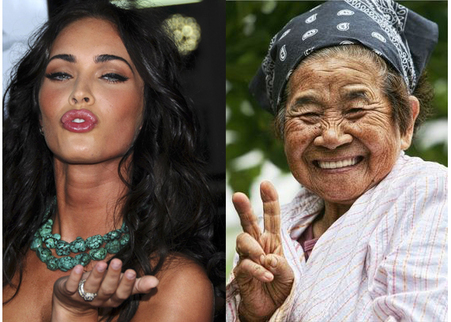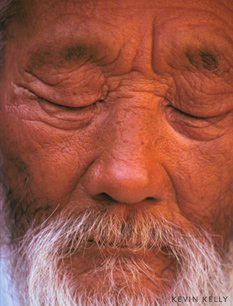
Who wants to look 25 forever?
If you've been brought up or conditioned to any extent by mass western culture, you may find your answers to those questions a little bit contradictory!
The western world is obsessed with youth, yet most of us want to live forever. Which implies ageing.
Our cultural impetus is on remaining youthful looking at any cost but at the same time, wanting to extend our life span for as long as possible - it's a really weird mix.
Whilst I was in India earlier this year, I was astounded and pleasantly surprised to see billboards with elderly female politicians, activists and even moviestars - complete with jowls, pigmentation spots, double chins and droopy eyelids. How refreshing! You never see this kind of thing in Australia.
Of course there is a reverence for youthful beauty in India, but it doesn't totally predominante the media's portrayal (and therefore, the people's acceptance) of women. It got me thinking - if I had to choose between the two, would I rather live to 100, or look 25 forever? Obviously one is possible naturally, the other is somewhat possible via unnatural, expensive and painful means. So having a low tolerance to pain and no progress to date in my plastic surgery funds savings account, I guess I'll go for living until 100! (And just enjoy being 27 while I'm at that actual age).
The nutritionist in me then asked the inevitable question: what should we eat to live to a healthy 100, rather than the decrepit centenarian on life support and a plethora of medications that fuels the fear of ageing? And possibly even retain into advanced age, a degree of sexiness, aliveness, vivacity and pep? (I realise that using that word reveals a distinct lack of pep).
To answer this, we need to distinguish between life span and health span.
Life span vs Health span
Big woop!
Many of us have spent time in nursing homes or seen grandparents battle with multiple chronic diseases for years leading up to their deaths. Life span seems more an indicator of how accessible modern medicine and pharmaceuticals are than how healthy a people are overall.
Life span is measured in years, but a longer life doesn't necessarily mean a healthier life. For many people in the western world, optimal health is reached between ages 20-30, after which pre-disease states start to set in and health deteriorates over the next few decades - asthma or allergies in your 20's, adrenal fatigue and PCOS in your 30's, pre-diabetes or diabetes in your 40's, high blood pressure in your 50's and so on. Check out any national health statistics for cancer, heart disease, diabetes and other chronic diseases - and the ever-younger ages people are developing these conditions - and you'll see that we have succeeded in extending our lifespans, only to spend more of our lives dying slowly.
Despite its amazing advances in treating acute health crises, modern medicine has been less successful in treating chronic disease, prolonging life span but not the proportion of life spent in an optimally healthy state. Our hospitals and nursing homes are filled with people "living" to ever increasing ages, but rather than dying late in life, people are spending more time starting to die early in life, and spending much of it in a suboptimal state of health.
Diet to live to 100
So how do they do it? Sure, they exercise far more, have a respect and adulation for elders, find joy in their work and don't have a word for retirement in their vocabularies; all of this contributes to their comparitively long and vitality-filled lives. But from a purely dietary perspective, the traditional diets of these long-lived cultures are remarkably similar:
* The percentage of their diets that come from plant foods is between 90% (Abkhasians of Soviet regions) and 99% (Vilcabambans of Ecuador and the Hunzas)
* Their consumption of salt is low, and consumption of refined sugar and processed food is nil. Yep, not a smidgen of crap.
* Their overall daily calorie intake (adult males) is 1800 to 1900. In Australia, where lifestyles are far more sedentary, the average man consumes 2650 calories a day.
* In these diets, percent of calories from protein ranges from 10 percent to 15 percent, from fat it's 15-20% and from carbohydrates it's 65-74%. Mind boggling to the average westerner, who has been told to up the protein and cut the carbs in order to lose weight! The U.S. Department of Health and Human Services recommends a daily macronutrient ratio of 10 percent to 35 percent protein, 20 percent to 35 percent fat and 45 percent to 65 percent carbohydrates.
I'm not saying we should emulate exactly the macronutrient ratios of these cultures, in the same way I don't expect we should all live in mud houses and run up mountains for 6 hours a day. These are simply points to think about and experiment with in your diet, rather than replicate exactly. And it doesn't have to complicated. In the words of Michael Pollan, "Eat real food. Mostly plants. Not too much."



































 RSS Feed
RSS Feed



